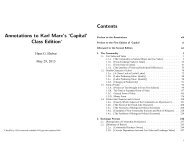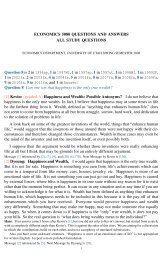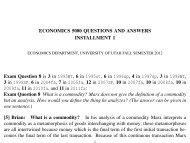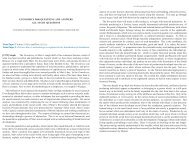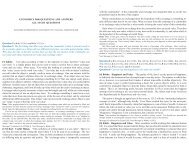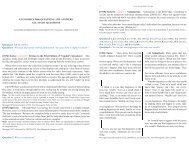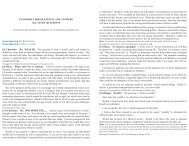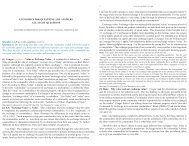Question 1 What did Marx mean with his formu - University of Utah
Question 1 What did Marx mean with his formu - University of Utah
Question 1 What did Marx mean with his formu - University of Utah
Create successful ePaper yourself
Turn your PDF publications into a flip-book with our unique Google optimized e-Paper software.
U <strong>of</strong> <strong>Utah</strong> Econ 5080 2007fa 71<br />
<strong>Marx</strong> describes the second peculiarity <strong>with</strong> the definition: concrete labor is the expression<br />
<strong>of</strong> abstract labor. T<strong>his</strong> <strong>mean</strong>s that abstract labor such as writing a book expresses the concrete<br />
labor which would be the printing <strong>of</strong> the book which then creates the value for paper.<br />
<strong>Marx</strong> defines the third peculiarity: a privately produced commodity in equivalent form<br />
counts as its opposite, directly social labor. An example <strong>of</strong> t<strong>his</strong> might be a mining company<br />
that mines gold and so has direct social powers <strong>mean</strong>ing they can directly exchange for all<br />
other commodities.<br />
Hans: Your third point is good, the other two are worthless. Just to avoid confusion by the readers, abstract and<br />
concrete labor are not the same as mental and physical labor, and paper has value even if it is not printed or written<br />
on.<br />
Message [152] referenced by [161] and [201]. Next Message by MichaelM is [174].<br />
[160] Melissa: graded A– T<strong>his</strong> is peculiar. In <strong>Marx</strong>’s words the three peculiarities <strong>of</strong> the<br />
equivalent form are as follows:<br />
1- “Use value becomes the form <strong>of</strong> appearance <strong>of</strong> its opposite, value”.<br />
2- “Concrete labor is the expression <strong>of</strong> abstract labor.”<br />
3- “A privately produced commodity in its equivalent form counts as its opposite, directly<br />
social labor.”<br />
How I interpret these three peculiarities is as follows:<br />
1-For my example I am going to use the two commodities flour and bread. Both <strong>of</strong> these<br />
commodities have their own different use value. Let’s say the baker wants to exchange a loaf<br />
<strong>of</strong> bread for one pound <strong>of</strong> flour. By accepting t<strong>his</strong> <strong>of</strong>fer and exchanging one pound <strong>of</strong> flour<br />
for one loaf <strong>of</strong> bread, the market now has an idea <strong>of</strong> how much labor is required to produce<br />
one pound <strong>of</strong> flour, it is equivalent to one loaf <strong>of</strong> bread. The bread has an equivalent form <strong>of</strong><br />
one pound <strong>of</strong> flour.<br />
2-If the bread and the flour are exchanged it is for the fact that both commodities require<br />
human labor. The baker would not exchange <strong>his</strong> bread for something that does not have<br />
human labor in it, such as water.<br />
3-Now let’s say that the baker is producing bread for <strong>his</strong> own use, to better <strong>his</strong> family and<br />
social status. If he bakes too much bread and exchanges it for another commodity, the bread<br />
now has social worth. It can be exchanged socially to “purchase” other commodities, acting<br />
like money.<br />
Hans: I am struck that you use water as example for a commodity that has no labor in it. A lot <strong>of</strong> labor is necessary<br />
before water can come out <strong>of</strong> the faucet in your home. The most critical issue <strong>of</strong> global warming for <strong>Utah</strong> is that the<br />
area will become increasingly arid. The winter snowpack in our mountains is a gift <strong>of</strong> nature which will be difficult<br />
and expensive to replace. Water is a precious, and potentially a very expensive, commodity.<br />
Ashley: While reading t<strong>his</strong> submission, I thought <strong>of</strong> the same thing that Hans thought <strong>of</strong>. How can water be an<br />
example <strong>of</strong> something that does not require labor? I see it as having the same characteristics as flour in terms <strong>of</strong><br />
using labor. I think the point that you were trying to make is that if you were to go to a lake or an ocean, it doesn’t<br />
cost anything for you to take water there, however, you can’t get flour just anywhere. It requires labor to make flour<br />
because it doesn’t come like that in its natural form. It’s not like water where you can drink it in its natural form.<br />
Flour has to be made. Is that what you were trying to say?<br />
Other than that, I agree <strong>with</strong> what you are saying. You can figure out the value <strong>of</strong> one item in comparison<br />
to another when it is exchanged in the market. Along the same lines, if a baker produces bread, and has excess<br />
amounts <strong>of</strong> it, it’s a great idea for them to use it as a social worth.<br />
72 2007fa Econ 5080 U <strong>of</strong> <strong>Utah</strong><br />
Hans: Good work, Ashley, trying to understand how Melissa came to say what she was saying. T<strong>his</strong> is part <strong>of</strong><br />
“immanent critique:” if someone comes to a conclusion other than your own, you are trying to understand why that<br />
person came to that conclusion.<br />
Message [160] referenced by [161] and [163]. Next Message by Melissa is [181].<br />
[161] Hans: Spontaneous Mirroring and Spontaneous Mystification. In section 3 <strong>of</strong><br />
the first chapter, <strong>Marx</strong> describes how the commodity owners, by exchanging their commodities,<br />
spontaneously mirror the inner structure <strong>of</strong> their relations <strong>of</strong> production on the surface<br />
<strong>of</strong> the market. Two examples <strong>of</strong> t<strong>his</strong> mirroring:<br />
(1) The invisible commonality and inner measure in all commodities, their value (congealed<br />
abstract labor), is reflected on the surface as their exterior common measure in money.<br />
(2) At the beginning <strong>of</strong> t<strong>his</strong> class I admonished you that whenever you think <strong>of</strong> commodities<br />
you must be aware that each commodity has two separate aspects, its use-value and<br />
its exchange-value. Now you can see t<strong>his</strong> inner separation reproduced in the separation <strong>of</strong><br />
the world <strong>of</strong> commodities into the ordinary commodities (use-value) and money (exchangevalue).<br />
Such mirroring is not unusual. Examples can be found in all sciences and in real life<br />
where things, through their activity, reveal their inner structure. It is much more unusual if<br />
things can be effective for a long time <strong>with</strong>out revealing themselves. Capitalism is unusual<br />
in t<strong>his</strong> second sense. It is a social order which can only thrive because and as long as<br />
individuals in capitalism do not understand their own social relations. That is why <strong>Marx</strong><br />
explores in section 4 <strong>of</strong> the first chapter the limits <strong>of</strong> t<strong>his</strong> spontaneous mirroring, i.e., the<br />
mystification inherent in the commodity relations.<br />
T<strong>his</strong> mystification does not start in section 4. Already in section 3, <strong>Marx</strong> shows that the<br />
development <strong>of</strong> the value form has a contradictory character: it reveals the inner relations<br />
more and more accurately on the side <strong>of</strong> the relative form <strong>of</strong> value, but at the same time it<br />
mystifies them if one looks at the other pole, the equivalent form <strong>of</strong> value. Let me explain.<br />
If an ordinary commodity expresses its value in a certain amount <strong>of</strong> the general equivalent,<br />
it reveals the structure in which it is embedded. It says that it has something in common<br />
<strong>with</strong> all other commodities that has nothing to do <strong>with</strong> its use-value. It says that in t<strong>his</strong> relationship<br />
<strong>with</strong> other commodities its labor does not count as useful labor but abstract labor.<br />
And it says that t<strong>his</strong> labor will only get social credit if it fits into the social division <strong>of</strong> labor.<br />
But if you look at it from the other side, from the side <strong>of</strong> the money commodity (gold),<br />
then the underlying social structure is mystified rather than revealed. Now it is the special<br />
use-value <strong>of</strong> the commodity, namely, it being gold, which gives it value, i.e., direct access<br />
to every other commodity. The private labor producing gold does not need to pass the test<br />
whether it fits into the social division <strong>of</strong> labor, but it gives immediate social powers. T<strong>his</strong><br />
labor has these powers not because it is the expenditure <strong>of</strong> abstract human labor, but because<br />
it is the specific concrete labor <strong>of</strong> producing gold.<br />
I just repeated the three peculiarities <strong>of</strong> the equivalent form. In view <strong>of</strong> t<strong>his</strong> dissonance<br />
between form and content <strong>of</strong> the private labor producing gold, it is not surprising that t<strong>his</strong><br />
weirdness has been eliminated since <strong>Marx</strong> wrote Capital. Today we are no longer in a<br />
commodity money regime. The value <strong>of</strong> money is no longer guaranteed by the labor going



